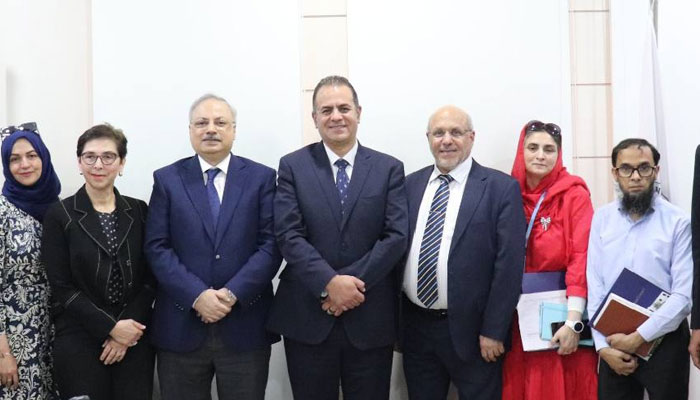WHO, PM&DC join hands to strengthen collaboration
Islamabad:In a major step towards strengthening Pakistan’s healthcare system, the World Health Organization (WHO) and the Pakistan Medical and Dental Council (PM&DC) agreed on Monday to collaborate closely to align medical and public health education with the country’s evolving Primary Health Care (PHC) needs.
During a high-level meeting held in Islamabad, a WHO delegation and PM&DC President Prof. Dr. Rizwan Taj discussed reforms to medical and public health curricula, aimed at producing a health workforce capable of addressing non-communicable diseases, maternal and child health, mental health, and emerging health challenges. "Our shared goal is to create a responsive, equitable, and sustainable healthcare system by strengthening the foundation of medical education," Prof. Dr. Rizwan Taj said while welcoming the delegation. He appreciated WHO’s technical expertise and ongoing support for improving healthcare outcomes in Pakistan.
The WHO delegation included Mr. Ravaghi Hamid, Mr. Mataria Awad, Dr. Gedik Fetheya Gulin, Dr. Mohsin Raza, Syed Shamsuzzoha Babar, Dr. Naveed Asghar, Tahira Ali, and Dr. Samia Latif. They emphasized the importance of embedding Primary Health Care principles into the core of medical education to enhance accessibility and quality of care across the country.
Responding to questions, Dr. Taj highlighted that PM&DC has directed all affiliated medical and dental colleges to establish outreach centres at their teaching hospitals or collaborate with existing Basic Health Units (BHUs) and Rural Health Centres (RHCs) to enhance practical training and promote community health services. He noted that people living in remote and suburban areas often face difficulties accessing even basic healthcare, leading to financial and emotional strain. Strengthening PHC networks, particularly in underserved areas, would help address these gaps, he said.
Dr. Taj informed the delegation that Primary Health Care concepts have already been integrated into the undergraduate curriculum, with plans underway to further embed Public Health and Family Medicine components at the postgraduate level. PM&DC, he said, has been applying stringent academic and operational criteria across the 185 medical and dental colleges in Pakistan to meet WHO’s standards for doctor-patient ratios and faculty requirements.
For the first time, PM&DC has introduced a curriculum with 1,700 hours dedicated to medical and allied health sciences education, including 75 mandatory hours focused specifically on Family Medicine. Dr. Taj shared that 123 letters were sent to medical colleges urging them to introduce Family Health Care modules, and 44 institutions have responded positively so far. He further revealed that the PM&DC Academic Board, comprising experts and stakeholders, is actively working on new initiatives to expand healthcare access and improve service quality. Future reforms, he said, would include leadership training in PHC, enhanced interdisciplinary education, and a stronger emphasis on medical ethics and communication skills. Concluding the meeting, Prof. Dr. Rizwan Taj announced that PM&DC is set to launch Continuing Professional Development (CPD) and Continuing Medical Education (CME) programs, linking them to the Council’s doctor revalidation processes.
-
 South Korea: Two Killed As Military Helicopter Crashes During Training
South Korea: Two Killed As Military Helicopter Crashes During Training -
 Elon Musk Unveils SpaceX’s Moon-first Strategy With ‘self Growing Lunar City’
Elon Musk Unveils SpaceX’s Moon-first Strategy With ‘self Growing Lunar City’ -
 Donald Trump Slams Bad Bunny's Super Bowl Performance: 'Absolutely Terrible'
Donald Trump Slams Bad Bunny's Super Bowl Performance: 'Absolutely Terrible' -
 Jake Paul Criticizes Bad Bunny's Super Bowl LX Halftime Show: 'Fake American'
Jake Paul Criticizes Bad Bunny's Super Bowl LX Halftime Show: 'Fake American' -
 Prince William Wants Uncle Andrew In Front Of Police: What To Expect Of Future King
Prince William Wants Uncle Andrew In Front Of Police: What To Expect Of Future King -
 Antioxidants Found To Be Protective Agents Against Cognitive Decline
Antioxidants Found To Be Protective Agents Against Cognitive Decline -
 Hong Kong Court Sentences Media Tycoon Jimmy Lai To 20-years: Full List Of Charges Explained
Hong Kong Court Sentences Media Tycoon Jimmy Lai To 20-years: Full List Of Charges Explained -
 Coffee Reduces Cancer Risk, Research Suggests
Coffee Reduces Cancer Risk, Research Suggests -
 Katie Price Defends Marriage To Lee Andrews After Receiving Multiple Warnings
Katie Price Defends Marriage To Lee Andrews After Receiving Multiple Warnings -
 Seahawks Super Bowl Victory Parade 2026: Schedule, Route & Seattle Celebration Plans
Seahawks Super Bowl Victory Parade 2026: Schedule, Route & Seattle Celebration Plans -
 Keto Diet Emerges As Key To Alzheimer's Cure
Keto Diet Emerges As Key To Alzheimer's Cure -
 Chris Brown Reacts To Bad Bunny's Super Bowl LX Halftime Performance
Chris Brown Reacts To Bad Bunny's Super Bowl LX Halftime Performance -
 Trump Passes Verdict On Bad Bunny’s Super Bowl Halftime Show
Trump Passes Verdict On Bad Bunny’s Super Bowl Halftime Show -
 Super Bowl 2026 Live: Seahawks Defeat Patriots 29-13 To Win Super Bowl LX
Super Bowl 2026 Live: Seahawks Defeat Patriots 29-13 To Win Super Bowl LX -
 Kim Kardashian And Lewis Hamilton Make First Public Appearance As A Couple At Super Bowl 2026
Kim Kardashian And Lewis Hamilton Make First Public Appearance As A Couple At Super Bowl 2026 -
 Romeo And Cruz Beckham Subtly Roast Brooklyn With New Family Tattoos
Romeo And Cruz Beckham Subtly Roast Brooklyn With New Family Tattoos




